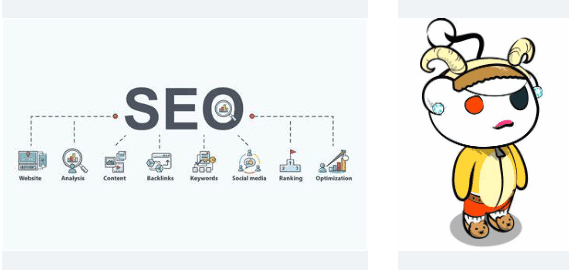Staying on top of the latest SEO trends and strategies is critical for any business looking to drive traffic to their website and ultimately increase revenue as the digital landscape evolves.
In this article, we’ll go over some of the best SEO tips for 2023 to help you outrank your competitors and gain more visibility in search engine results this year.
1: Put a Greater Emphasis on User Experience (UX)
An emphasis on user experience (UX) is one of the most important SEO trends for 2023. Google has stated unequivocally that it prioritises websites that provide a positive user experience, and this trend is expected to continue.
Focus on creating a clean and easy-to-navigate design, providing valuable and informative content, and ensuring that your website is mobile-friendly.
On the content front, creating valuable and informative content means providing answers in the right medium and format. This is a UX focus too.
Think about what a user’s expected result is. For example, a recipe search will need a video result, and a search for specs of a car will require content to be formatted into a table.
2: Optimise for Featured Snippets
Another important trend for 2023 is featured snippet optimisation. Featured snippets are answer boxes that appear at the top of search engine results and can drive a lot of traffic to your website.
Make sure your content is well-researched and provides clear, concise answers to the questions being asked if you want to optimize for featured snippets.
This also comes back to the point made by UX. Your content needs to be presented in the right way to even be eligible for a featured snippet result. Do the research first and craft your content accordingly.
3: Make use of long-tail keywords
This may sound like a regurgitated talking point, but long-tail keywords continue to gain popularity in the world of SEO. This is for a few reasons:
– These are less competitive keywords that can drive more targeted traffic to your website. Include long-tail keywords that are relevant to your business and the topic at hand when creating content.
– These are keywords that often trigger “People Also Asked Results”
– These are often new keywords. When a new product launches, or there’s an update, news story etc, new terms will emerge.
The fastest and easiest way to gain coverage on emerging topics is by utilising long tail keywords.
4: Produce Excellent Content
Again, sounds obvious right? Any successful SEO strategy must include the creation of high-quality content. It not only adds value to your audience’s experience, but it also gives Google a reason to rank your website higher in search results.
Make certain that your content is well-researched, informative, and interesting. And make an effort to create content that is relevant to your target audience’s interests.
This means optimising for intent, structuring your content correctly and providing answers in the right medium and/or format.
Also be sure to cite relevant and authoritative resources, as this adds another element of expertise to your content.
5: Place a Big Focus on Local SEO
If your company has a physical location, it is critical to optimise for local SEO. This includes ensuring that your website is listed in local directories like Google My Business, Yelp, Bing Places etc… and that your address, phone number, and other contact information is accurate and consistent across the web.
“Near me” searches have been on the rise for years. Studies also show that the majority of users who search for a local business go on to visit that business shortly after.
Local SEO is all about being where your customers are. Don’t neglect your GMB and look for local partnership opportunities to help boost your reach (and maybe gain a few links).
To learn more about optimizing your local SEO efforts, check out the resources offered by Intellar
6: Create High-Quality Backlinks
Speaking of backlinks, links continue to be a significant ranking factor for Google. In my opinion they always will.
To generate high-quality backlinks, make sure your website offers valuable content that other websites will want to link to. This is known as link baiting.
To generate high-quality backlinks, make sure your website offers valuable content that other websites will want to link to. This is known as link baiting.
You can also contact other websites in your industry and request that they link to your content. If you have a valuable piece to share, reach out to relevant websites and see if they’ll be happy to quote your content.
When it comes to off-page SEO, SEO services such as building high-quality backlinks can make a big difference
7: Promote Your Website Using Social Media
Social media is an excellent way to promote and drive traffic to your website. Share your content on social media and interact with your followers. You can also use social media to reach out to industry influencers and ask them to share your content with their followers.
Unlinked brand mentions and brand signals from social also help Google validate the legitimacy of your website. While not a direct ranking factor, social posts can rank in search (think Twitter cards in particular), so there is an SEO benefit to pushing your brand and content on social media.
8: Analyse Your Analytics
Monitoring your analytics is essential for determining how well your website is performing and where improvements can be made.
Track your website’s traffic, bounce rate, and other metrics using tools like Google Analytics and Google Search Console.
Also, monitor your search engine rankings to see how your SEO efforts are affecting your visibility in search results.
SEO is all about testing and optimising, so without tracking performance and making edits, you’re missing out on potential SEO gains. A great tactic here is to review GSC query coverage and eliminate competing pages. Topical overlap and internal cannibalisation can hurt your SEO performance.
Summary
To summarise, SEO is constantly evolving, and it is critical to stay up to date on the latest trends and strategies in order to drive traffic to your website and increase revenue.
You can give yourself the best chance of outranking your competition in search engine results by focusing on user experience, optimising for featured snippets, utilising long-tail keywords, creating high-quality content, optimising for local SEO, building quality backlinks, promoting your website on social media, and monitoring your analytics.
Keep in mind that SEO is a long-term strategy that necessitates consistent effort and attention. You can ensure that your website is always visible and relevant in the eyes of search engines and your target audience by following these tips and staying up to date with the latest developments in the industry.





























